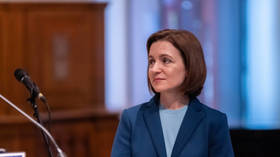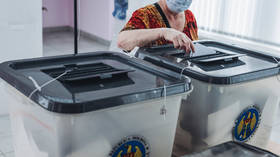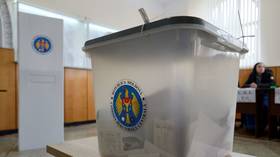Ex-Soviet state must back up election meddling claims – Kremlin

Moldovan President Maia Sandu must substantiate her claims about “criminal groups” interfering with Sunday’s presidential vote and a referendum on pro-EU constitutional changes, Kremlin spokesman Dmitry Peskov told journalists on Monday. Such strong accusations should not be made without a hint of proof, he said.
Late on Sunday, when the votes were still being counted, Sandu, who is seeking her second presidential term, claimed in a public statement that there was “clear evidence” of criminal groups supposedly working together with “foreign forces hostile to our national interests” in order to interfere with the voting.
According to the president, those malign forces sought to buy hundreds of thousands of votes in what she described as “fraud of unprecedented scale.” Sandu then vowed to “respond with firm decisions” to the perceived transgressions.
The Moldovan leader did not name any specific groups she believed could be behind the irregularities, nor did she present any specific evidence to back up her claims.
“This is a rather serious accusation,” Peskov said, commenting on the issue. “Some evidence must be presented to the public” to substantiate it, he added. If Sandu believes she had not received votes because of some gangs, she should present clear proof of that, the Kremlin spokesman said, adding that “it would be nice if she explained the number of votes that disagreed with her line.”
“Does she mean that Moldovan citizens who do not support her are associated with criminal groups?” Peskov asked.
Moldovan citizens residing in Western nations, whose ballots were counted last, reportedly tipped the balance in favor of the pro-EU amendments. The ‘yes’ vote gained the support of 50.31% of voters while 49.69% voted against.
Sandu also received a boost to her election performance, with her final result amounting to 42% of the vote, up from the 38% earlier reported by Reuters. Her main rival, the Party of Socialists’ Alexandr Stoianoglo, got 26%. Peskov questioned how such a large change is possible, saying it was “difficult to explain.”
Prior to the vote, the Moldovan authorities claimed they had found evidence of Russian meddling attempts. Police arrested hundreds of people, accusing them of being part of an alleged “vote-buying scheme,” according to AFP. Law enforcement officials also claimed this week that up to a quarter of the ballots could supposedly be “tainted by Russian cash.”
In her post-election statement, Sandu stopped short of pointing the finger at Russia. Brussels still accused Moscow of what it called “unprecedented interference and intimidation” in the wake of the voting.
Since neither of the candidates managed to secure an absolute majority in the Sunday vote, Sandu will face off against Stoianoglo in a runoff on November 3.














